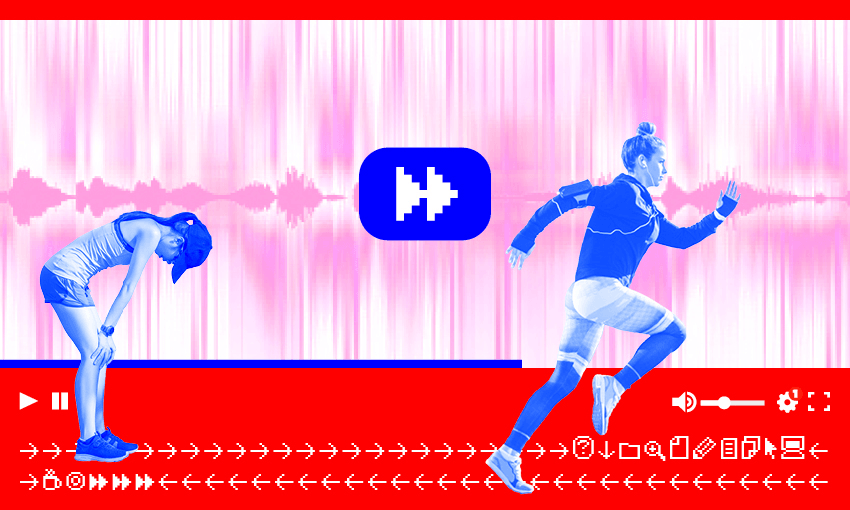For IRL, Shanti Mathias discovers what’s gained and lost when you listen to your podcasts, YouTube videos and recorded lectures at double speed.
I knew, even in that moment, that this was probably not an effective way to learn. But it was my first year of university, I’d been away for a few weeks, and I had some lectures to catch up on. It was early spring, and I also had to wax my legs.
Picture this absurd situation: one leg balanced on the sink covered in sticky wax, laptop tucked behind the tap, notebook stabilised on the keyboard, pen askew – and a recorded anthropology lecture playing at two times the original speed. Rip a strip of hair, pause the lecture to scrawl down something that seemed important, press play, words about participant observation and historical materialism made blurry. I have a piece of paper that says I have a qualification in anthropology, but choosing to watch several weeks of foundational lectures sped up while doing other activities is probably why I still couldn’t tell you the difference between Malinowski and Mead.
In the age of Covid, where remote learning is becoming the norm, speeding up lectures on platforms like Panopto is a common practice among time-pressed students. But the fast-forward feature is found on many online platforms, including YouTube and most podcast apps – and I’m not the only one who uses it.
One way to understand the motivation to speed things up is as a consequence of capitalism. In the US, cable TV channels were found to be speeding reruns of shows like Seinfield up by small amounts to fit more ad breaks into a half hour slot. “It’s the acceleration of modern life,” says Greg O’Beirne, a professor of audiology at the University of Canterbury. “People like to take control of their information.”
More than 500 hours of video are uploaded to YouTube every minute, not to mention the video and audio on every other website. In this avalanche of content, going at 1.5 or double speed lets you watch a few more videos, listen to a few more podcasts.
Speeding content up is theoretically more efficient for the time poor. “Since I have to work part time during uni, it’s a more efficient use of my time to speed through a 50 minute lecture in 25 minutes so I can go to work,” says Boston Flanagan-Connors, a law student living in Wellington. Flanagan-Connors watches most of his lectures sped up, and finds it a particularly useful revision tool – he watches back accelerated videos of lectures he attended in person to refresh his memory.
“Lectures go really slowly,” says Aden Jowsey, a masters student in Pōneke. Watching recorded lectures at speed was his gateway; he now watches four hours of YouTube a day at double speed. For Jowsey, this is recreational: the fast forward feature speeds the slow pace of competitive chess, allows him to watch video gamers sprint through challenges, and further compresses the already condensed wisdom of Ted talks.
Does speeding content come at the cost of comprehension, though? “When I hear [that my students speed up their lectures] I feel a little worried,” says Sasha Calhoun, a senior lecturer in linguistics at Victoria University of Wellington. Calhoun studies prosody, or the role of rhythm and intonation in language.
I ask her what effect speed has on the information contained in language. “Length [of sound] is used for emphasis,” she says. Dragging out a sound draws the listener’s attention to it, indicating that the information in that sound is more important. When the sound you’re listening to is sped up, it’s harder to distinguish what matters – another reason I may have failed to absorb my high-speed anthropology lectures.
That said, “some of the algorithms give excellent results,” O’Beirne says. In the last two decades, audio technology has advanced so sound can be accelerated without high-pitched distortion. While the exact algorithms vary, O’Beirne says sites like YouTube or Panopto will find the repeated sounds and overlap the audio, so the transitions are quicker, but the proportion of time a sound takes remains the same.
These intelligent algorithms are doing something that people cannot. “The limitation that humans have that machines don’t is just how quickly our tongues and teeth can move – there’s a speed limit on our speech production,” Calhoun says.
But is there a speed limit on comprehension? O’Beirne notes that human reading speed – just your eyes and brain converting letters to meaning – is much faster than speech. While reading, human brains can absorb information at more than 300 words per minute, while normal speaking speed is 140 to 190 words per minute. Lectures and podcasts, which are often more clearly enunciated and structured than casual conversation, can be sped up without any drop in comprehension, up to a point. “After 315 words per minute, you may feel like you’re absorbing more information, but you’re not taking it all in,” O’Beirne says.
Retention of information also depends on how much attention you’re paying. “Any distortion in speech signal reduces intelligibility and increases the amount of effort you have to put in as a listener,” O’Beirne continues. “If you’re listening at a slow speed and your mind drifts, you can use context to fill the gaps.” If the sound is sped up, this is a problem: “You have to dedicate all your cognitive resources to decoding [and] be totally focused.” In other words, it is of course possible to listen to accelerated anthropology lectures while waxing your legs, but don’t make the mistake I did in expecting to learn anything.
The human brain is remarkably adaptive, Calhoun says. “As we listen, we take in information about the social situation, contextual clues, emotional clues, [but] as we speed up the depth of processing goes down because we can’t spend as many cognitive resources [on noticing these things].” Sped-up audio reduces the ability to process information as you go, and conveying information on screens or speakers also reduces the social context that makes memories stick.
Calhoun and O’Beirne are invested in the questions of language, learning, and listening that sped-up content raises. For day-to-day information consumers, however, these concerns are less pressing than a far more noticeable side-effect: it makes recorded voices speaking at regular speed sound absurd. “Once you go to two times [speed], you can’t go back,” says Jowsey. “The voices change, [normal speed] sounds too slow.”
At this point, 1.25 times increased speed sounds relaxing to me, even normal. Walking into a room where I’m playing a podcast, my flatmates will ask why I’m speeding it up and I find myself almost ashamed that I can’t even notice a difference.
What’s the line? Is any art sacred? “People would be horrified if they knew we were speeding things up, when they put a lot of effort in,” says O’Beirne, who often speeds up audiobooks to compensate for slow narrators.
“[Speed] ruins the enjoyment for me,” says Flanagan-Connors. “I use it purely for information gathering, when I want to know the answer as quickly as possible.” He wouldn’t dream of speeding up TV, although some streaming sites offer this feature.
“I’m worried it’s not healthy,” says Jowsey, who nonetheless would recommend that others try speeding content up – he enjoys the commentary and tension of the chess world championships just as much at double speed. “I want to give my heartfelt thanks to whatever engineer or software designer … thought to add a speed multiplier. You are a genius, you are an innovator well beyond your time.”
Flanagan-Connors, who has at least another year of law lectures to absorb, echoes Jowsey’s praise. “Whoever came up with the tech is my hero,” he says.
In this case, the fast-paced modern world is quite literally faster; most people can make the content they watch and listen to go more quickly if they want. But not everything can be adjusted. “Tell you what – I wish I could write my masters at two times speed,” says Jowsey, laughing.

